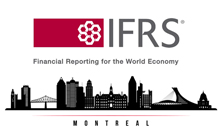Everyone should have a say on the future of green accounting

Canada may adopt international sustainability reporting rules that focus on investors, not the public, warn three Canadian accounting professors
 |
David Cooper is an emeritus professor of accounting at the University of Alberta; Jeff Everett is a professor of accounting at York University; and Daniela Senkl is an assistant professor in accounting at the University of Guelph. |
ACCOUNTING is widely considered the language of business — its impact, however, goes far beyond the world of business, reaching far into all of our lives.
Accounting and corporate reports typically — and incorrectly — assume that value can best be expressed in financial terms. They also assume that value is determined through so-called “fair markets” where goods and services are priced accurately and in good faith.
These ideological biases result in more of our lives being understood predominantly in money terms, with people and the environment being treated as commodities. Increasingly, values cease to exist outside the financial realm.
Accounting and the mysterious language of accountants are important to all of us — citizens cannot leave the reporting to the accounting profession and their assumptions about who and what is important. They assume profits are good, however created, but employee well being and environmental degradation are irrelevant.
It suits accountants to be seen as too technical to be understood by the average person — that way, they don’t have to justify their decisions. Recent proposals on sustainability reporting for all significant Canadian organizations reflects this, and should have us all concerned.
Sustainability reporting
Sustainability reporting — sometimes also referred to as environmental, social and governance (ESG) reporting — requires organizations to publicly report on a wide range of performance goals, not just profits.
Sustainability reporting is useful to employees, customers, citizens and governments to assess the impact and sustainability of an organization’s activities. The most popular ESG reporting system, developed by the Global Reporting Initiative (GRI), highlights environmental issues, employee well being and social contributions made by organizatons.
But over the last few years, the international accounting profession, led by the International Sustainability Standards Board (ISSB), has created its own set of rules that focuses solely on the needs of investors.
This issue has recently come to a head in several countries, including Canada. The Canadian accounting profession supports the ISSB, and, dramatically, is proposing to extend this neoliberal approach to every significant organization.
Missing perspectives
Last December, the Canadian accounting profession quietly released their consultation paper on sustainability standard setting in Canada.
There are clearly some positives: It makes some welcome gestures regarding diversity, equity and inclusion, suggests making the setting of standards independent from the accounting profession and it appeals to the public interest.
But the consultation paper does not define who that public is, nor does it offer substantive proposals in any of the above listed areas. It also ignores Indigenous and feminist perspectives, which question the very core of accounting’s definitions of assets and liabilities.
As public policy expert Marilyn Waring pointed out decades ago, if women really counted, then unpaid labour, clean water and air and beautiful landscapes would also count. Canada increasingly recognizes the need to reflect on, and publicly discuss, the important role of language as a tool of colonization and repression.
Language directs our thinking, and the language of business is no exception. Sustainability reporting is an invitation to start discussions about how accounting language structures society and renders important aspects of life invisible.
The Canadian accounting profession has always prioritized male and colonial-settler views, meaning that it prioritizes private ownership and market transactions. For all its talk, the consultation paper focuses on making sure the ISSB’s financial perspective is implemented in Canada.
The proposed sustainability standard board aims to mirror the ISSB, as shown in the terms of reference section of the consultation paper. It does not recognize its own financial, gendered, colonial biases and ignores multi-stakeholder approaches such as the GRI. Instead it paves the way for systematic greenwashing.
The Canadian standards will apply to all significant organizations, not just those listed on a stock exchange. Sustainability reporting, as defined by the ISSB, pressures governments, publicly owned organizations, not-for-profit enterprises and most corporations to focus on investors and bankers while ignoring the concerns of everyone else.
Canadian accountants’ woeful neglect of the public interest ignores the impact these standards will have on future generations and the planet’s capacity to meet the needs of our children.
Now is the time to act
The rules of the Canadian sustainability standards board will eventually make their way into laws and regulations. The most inclusive and sensible approach to encourage genuine sustainability and inclusion is a perspective that includes multiple stakeholders, including the general public.
But without public intervention and outcry — and without public demand that the accounting profession do something different — people in Canada will be left with ESG rules that focus on investors, not the public.
It is important that people in Canada make their voice heard and let the accounting profession (and the government) know that inclusive sustainability rules are essential for Canada. The consultation process is open to anyone to respond until March 31.
The future of ESG reporting, and the future of sustainability in Canada, is at stake. Who makes the rules, and which stakeholders are considered when the rules are set, matter greatly.
The sustainability reporting rules will influence the required disclosures for organizations. This, in turn, will impact decisions and actions relating to sustainability affecting Canadians.
David Cooper is an emeritus professor of accounting at the University of Alberta; Jeff Everett is a professor of accounting at York University; and Daniela Senkl is an assistant professor in accounting at the University of Guelph. Top image: iStock. Author photos: The Conversation Canada.











(0) Comments